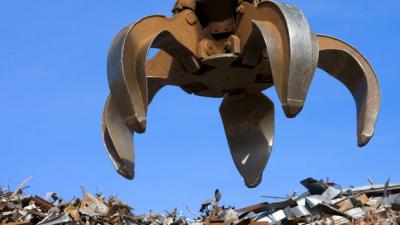Metal from the trash heap may one day wind up inside your smartphone instead of the other way around (Credit: rihardzz/Depositphotos)
Stainless steel mesh is often used as filters and screens in facilities such as wastewater treatment plants or in ventilation shafts. But once the material gets coated in rust and weakened, it's usually just discarded. Now Chinese scientists have figured out a way to take that metal trash and turn into high-performing treasure as electrodes in potassium-ion batteries.
While lithium-ion batteries are widely used today, they're not without their issues. For starters, they degrade over time, especially if they're not stored in a cool place. They also have the annoying tendency to explode sometimes and, compared to sodium- or potassium-ion batteries, they are expensive.
But potassium batteries, which could be a cheap and stable alternative to lithium batteries, have their challenge as well: Potassium ions are fairly large, so storing them as they transfer back and forth between electrodes in a battery tends to degrade the electrodes themselves.
The new method developed by a team from the Chinese Academy of sciences and Jilin University tackles both the problem of handling the large potassium ions and the problem of excess steel-mesh waste.
First the researchers took the rusty mesh and dipped it into a solution of potassium ferrocyanide. This compound is also called yellow prussiate of potash and is used in gardening, wine making and as an anti-caking agent in salt. When the metal hits the solution, iron, chromium and nickel ions are leached out of the rust which join the ferrocyanide ions to form Prussian blue. This complex salt that's been used as a dye, a paint, and as a coating in machine part manufacture stays on the surface of the mesh in the form of a scaffold of nanocubes. This scaffold provides an ideal place for potassium ions to rest between trips from one electrode to another in a battery.
Next, the newly blue mesh is dipped into a solution of graphene oxide which provides a coating that keeps the Prussian blue matrix from clumping, while also giving the electrodes a boost in terms of their ability to conduct electricity.
"In tests, coin cells made with these new electrodes demonstrate excellent capacity, discharge voltages, rate capability, and outstanding cycle stability," says a report about the invention. "Because the inexpensive, binder-free electrodes are very flexible, they are highly suitable for use in flexible electronic devices."
The finding could help potassium ion batteries join other potential lithium ion battery replacements including aluminum ion, sodium ion, fool's gold, lithium oxygen, and high-capacity lithium sulphur.
The research has been reported in the journal Angewandte Chemie.




